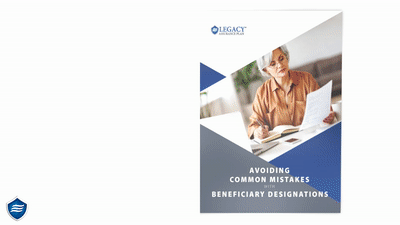When a person under the age of 18 stands to receive an inheritance, it raises several legal and financial considerations and requires thoughtful estate planning to ensure the child’s best interests are served.
Minors are legally incapable of owning property in their own right, so they cannot directly assume control or management of the inherited assets. This is based on the lack of maturity and decision-making ability typically associated with minors and their tendency to make poor decisions and be targets for exploitation. Minors, still in the process of maturing, may not fully comprehend the moral and ethical responsibilities associated with property ownership.
In the eyes of the law, people under the 18 are presumed to lack the knowledge and experience needed to make informed and responsible decisions. Their ability to assess situations, understand implications and predict consequences is not as advanced as it is in adults, making them more prone to making impulsive or ill-informed decisions. The law seeks to protect minors from the consequences of their lack of judgment and experience. By restricting their ability to own property, the law aims to shield minors from potential losses, exploitation and adverse outcomes stemming from their limitations.
As a result, minors lack the legal capacity to enter into binding contracts. Many transactions involving real property, such as buying, selling, leasing or mortgaging, require contractual agreements. However, the impulsivity and lack of foresight associated with youngsters can lead to rash decisions that impact the value and management of property, potentially resulting in long-term harm to the minor's financial well-being.
That’s why parents or legal guardians are responsible for the well-being and best interests of their minor children, including managing any property or assets the minor may have until the minor reaches the age of majority and can legally assume responsibility for their property.
Can a child under 18 receive an inheritance?

A minor can inherit property or assets. However, there are specific legal mechanisms in place to protect and manage these inheritances until the child reaches the age of majority.
One common approach is through the creation of a trust in an estate plan. A trust is a legal entity that holds assets on behalf of beneficiaries, including minors.
With this arrangement, when an individual creates their estate plan, they can designate a trustee who will manage and distribute assets to the minor beneficiary according to the terms specified in the trust document. The trust serves as a protective vehicle for managing inheritances for minors since they are not legally able to handle financial matters themselves.
It ensures that their best interests are safeguarded and that their inheritance is properly handled until they reach adulthood. Additionally, by establishing a trust as part of an estate plan, individuals have more control over how and when their assets will be distributed to their minor children after their passing.
It's also important for parents or guardians to consider appointing a custodian for any property or financial accounts left directly to minors outside of a trust structure. A custodian is responsible for managing and safeguarding these assets until the child reaches adulthood or another predetermined age.
This option may be suitable for smaller inheritances or less complex estates where establishing a full-fledged trust might not be necessary. While it is possible for children under 18 years old to receive an inheritance, it is crucial that proper estate planning measures are put in place to ensure their welfare and protect their interests during their minority years.
Establishing trusts or designating custodians provides peace of mind knowing that a trusted individual will oversee the management and distribution of assets until such time as the minor becomes legally capable of handling their inheritance. By integrating these crucial elements into one's estate plan, individuals can ensure a secure future for their minor beneficiaries while preserving the value of their estate.
At what age should a child receive an inheritance?

Determining the appropriate age for a child to receive an inheritance is a crucial aspect of estate planning.
While there is no one-size-fits-all answer, several factors come into play when making this decision. First, it's important to consider the maturity level of the child. Some children may exhibit a high level of responsibility and financial acumen at an early age, while others may require more time to develop these skills.
Another factor is the size and complexity of the inheritance. For larger inheritances or those involving significant property or assets, it may be wise to delay distribution until the child reaches a certain age or achieves specific milestones.
By appointing a trustee or custodian to manage and administer the trust until the child reaches a predetermined age or milestone, you can ensure that their inheritance is protected while providing for their financial needs in the interim. That way, even if something were to happen to you while your child is still young, you can have peace of mind knowing that responsible individuals will oversee their financial affairs until they are ready. For example, perhaps you would like for a 16-year-old to be able to purchase a car when they get their driver’s license. A trustee or custodian can ensure that a reliable and affordable model would be a more prudent choice, although the teenager may prefer a new Corvette.
It's important to consult with legal professionals specializing in estate planning when determining at what age your child should receive their inheritance. They can provide invaluable guidance based on your specific circumstances and local laws governing minors' rights to inheritances.
Determining at what age a child should receive an inheritance is not a simple matter but requires careful consideration by taking into account various factors such as maturity level, complexity of assets involved in the inheritance and legal regulations governing minors' rights.
What happens if I Ieave an inheritance directly to a minor?
If an inheritance is left directly to a minor without any arrangements in place, a probate court may need to appoint a guardian to manage the inheritance until the minor reaches the age of majority, usually 18. This can be a time-consuming and costly process, and leaving an inheritance directly to a minor can present several challenges and potential complications.
With no legal entity or adult designated to manage the inheritance, a court may intervene to appoint a guardian to handle the assets. This can lead to unwanted court involvement, time-consuming and burdensome legal hearings and costly legal fees. Plus, the court-appointed guardian may not manage the assets in the best interest of the minor, potentially leading to mismanagement or depletion of the inheritance. Also, if family members disagree on the appointed guardian or the management of the minor’s assets, it can lead to conflicts, disputes and legal battles within the family.
How can an inheritance disqualify a child from receiving benefits?
When a minor receives an inheritance directly, it may impact their eligibility for certain government benefits. Eligibility for those benefits, such as Supplemental Security Income (SSI) and Medicaid, is usually based on the recipient’s income and assets. When a minor receives an inheritance, it can increase their assets and income, potentially disqualifying them.
Receiving an inheritance may also affect eligibility for other public assistance programs like Temporary Assistance for Needy Families (TANF) or food assistance programs, which also have stringent income and asset requirements. Also, certain educational assistance programs and scholarships have eligibility criteria based on financial need. An inheritance can affect a minor’s eligibility for such programs by altering their financial status. Plus, minors in foster care may receive benefits and support that also depend on their financial need, and an inheritance can alter this need assessment, affecting their support.
How can a parent give an inheritance to a child?

When considering how a parent can give an inheritance to a child, there are several important strategies to explore. As mentioned, one common method is through the creation of a trust. By establishing a trust, the parent can designate the child as the beneficiary and appoint a trustee to manage the assets until the child reaches a certain age or milestone specified in the trust document.
This approach provides flexibility and control over how and when the child receives their inheritance, ensuring that they do not gain access to substantial wealth at too young an age. Within a trust, parents can choose between various types, such as revocable trusts or irrevocable trusts.
A revocable living trust allows parents to maintain control over their assets during their lifetime while designating provisions for distribution after their passing. This type of trust enables modifications if circumstances change, providing some level of adaptability for estate planning purposes.
On the other hand, an irrevocable trust transfers ownership of assets immediately upon creation and cannot be altered without consent from both trustee and beneficiary. While this type of trust offers less flexibility for altering provisions later on, it may provide additional tax benefits and asset protection for both parents' estates and their children's inheritances.
If the minor has special needs, establishing a special needs trust can allow the minor to benefit from the inheritance without jeopardizing eligibility for government benefits.
Another approach parents can consider is establishing custodial accounts or Uniform Transfers to Minors Act (UTMA) accounts specifically for their children's inheritances. These types of accounts allow parents to transfer assets directly into an account held in the minor's name but managed by a custodian until they reach the age of adulthood.
While this method provides simplicity in terms of administration, it lacks some of the control and discretion that trusts offer. Ultimately, when determining how to give an inheritance to their children, parents should consult with estate planning professionals who can help navigate legal requirements and tailor strategies based on individual circumstances.
Each family situation is unique; therefore, it is crucial to consider various factors such as the size of the estate, the child's age and maturity as well as any special considerations that may necessitate tailored provisions within the estate plan. By carefully considering these factors and working with professionals, parents can design an inheritance plan that best suits their goals for their children's financial well-being and future.
Conclusion
Creating a trust allows for greater control over how the inheritance of a minor is managed and distributed. The parent or guardian can appoint a trusted individual or financial institution as the trustee who will act as a custodian for the minor's assets until they come of age.
This ensures that the inheritance is safeguarded and used wisely in accordance with the intentions outlined in the estate plan. Another crucial aspect to consider is designating alternate beneficiaries in case something unforeseen happens to both parents or guardians before the child reaches adulthood.
This prevents any potential complications or disputes regarding who should inherit if tragedy strikes. Additionally, parents should regularly review and update their estate plans as their circumstances change to reflect any new considerations that may arise.
Ultimately, by proactively addressing these matters through thorough estate planning, parents can provide peace of mind knowing that their child's future will be secure even if they are not there personally to guide them. It is important not only to consider tangible assets but also financial resources and emotional support that may be necessary for a minor's upbringing and education.
While navigating estate planning involving minors requires careful attention to detail, it is an opportunity for parents and guardians to create a legacy that provides stability and opportunities for their children even after they are gone. By seeking professional guidance from an experienced attorney specializing in estate planning, families can tailor an effective strategy that ensures both financial security and emotional well-being for their young heirs.



